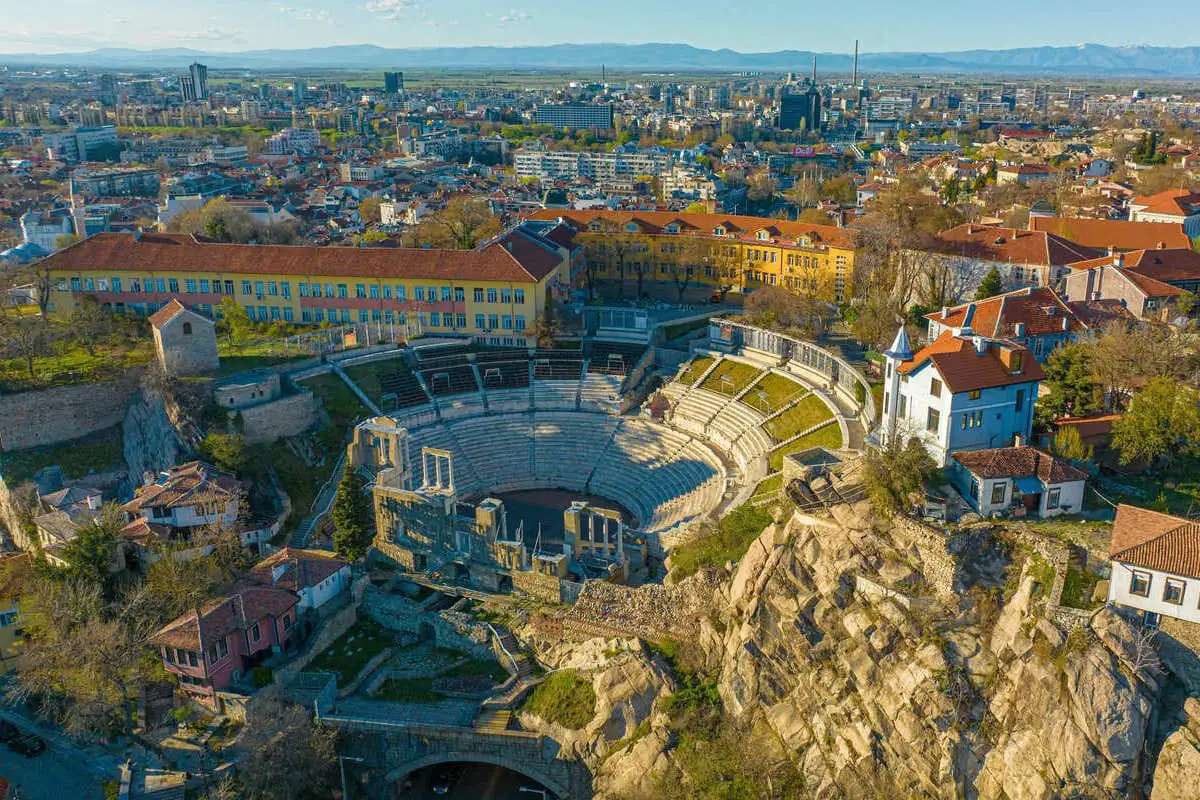
Be it for the ancient ruins, the ornate public fountains, or the world-class gastronomy, there are many reasons why we love Rome. While the rising costs and crowds could never keep us from coming back, there’s no denying they can dim the magic a little.
We are Travel Off Path, after all, and our main passion is discovering destinations yet to be overwhelmed by the masses.
All of this to say we’ll never discourage you from visiting Rome, but if you’re looking for a cheaper, more offbeat alternative, where you won’t be waiting in line for several long minutes, if not hours, to visit an attraction, there’s always a gorgeous, yet hugely underrated Plovdiv:


So This Is Europe’s Oldest City?
At Least On Record?
Located in central Bulgaria, Plovdiv is in fact the oldest continuously-inhabited city in the European continent. Yes, it surpasses Rome itself, and even Athens, with evidence of habitation reaching as far back as the 6th century BC.
This would make it over 8,000 years old!
Ancientness aside, Plovdiv’s main allure is its enviable collection of Greco-Roman monuments, one of the largest ensemble in Eastern Europe. It’s no wonder we love to call it ‘Rome of the East’—don’t worry, Istanbul, you can both share the title.
Back in Roman times, Plovdiv was also a Roman outpost, under the name Philippopolis, and if you’re a culture buff wondering whether there’s any leftovers from that period still scattered around… boy, you’re in for a big treat:


No Colosseum, But You Get This Instead
Plovdiv’s main sight is the Roman Theater of Philippopolis: as the name indicates, it was built at the time of the Roman colony, more precisely in the 1st century AD.
It’s not an arena, per se, like the Colosseum, and at its peak, it was mostly used for theatrical performances, with the occasional gladiatorial game. It’s definitely not as big as the average Roman arena, sitting up to 6,000 spectators, but it’s nonetheless impressive.
The marble seats are in remarkably-good condition, and the scaenae frons, the richly-decorated background of the stage, continues to be supported by a few surviving columns, set against the modern city.
We’ll get back to this shortly, but in case you’re wondering, it’s a lot cheaper to visit than a Roman ruin in Italy: the entrance fee is around 5 Bulgarian lev, or approximately $2.80.


Ancient Roman Ruins Galore
Other must-see Roman structures of the ancient Philippopolis include the Roman Stadium and the Roman Forum (and its adjacent Odeon):
Whereas the theater impresses more due to its ornamentation than its size, the stadium was one of the bygone empire’s largest, accommodating up to 30,000 spectators in its heyday. It was notoriously used for athletic competitions and chariot racing.
Regrettably, much of the stadium lies beneath Main Street, and it’s only partially visible in a few places: the most famous is Dzhumaya Square, close to the Ottoman-era mosque.
The exposed seating area can be seen from a viewing platform on the square, though a small fee of under $3 will get you to the underground section if you want to visit.


Our favorite section to see, and that most tourists aren’t even aware, is the H&M one. Yes, as in the H&M store: like many of the buildings and shops lining the Main Street, it was built atop the ancient structure, and if you pay yet another symbolic entry fee, you can go underground to see it up close.
The Roman Forum was built in the 1st century AD as the city’s main administrative and commercial center. It features (yet another) theater (the Odeon in question), remnants of temples, and even a Roman library, one of the few existing ones in the Balkans.
Plovdiv Remains Unspoiled
As you will notice wandering about Plovdiv Old Town, a cobble-paved maze of colorful, Bulgarian Revivalist houses with prominent covered balconies, crowds here are minimal.


There are tourists, for sure—this is still one of Europe’s oldest cities, and its ancient allure is undeniable—but in general, Plovdiv remains a lesser-known destination.
Bulgaria as a whole is pretty offbeat, and with most tourists heading straight for the Black Sea Coast, to the affordable resort areas in Varna and Burgas, cities like Plovdiv, and even the national capital Sofia, continue to be largely overlooked.
According to the National Statistical Institute of Bulgaria, Plovdiv hosts an average 1 million tourists per year, most of which are Bulgarian.
That’s some time ago, but in 2019, only 121,478 foreigners were present in cultural events in the city.
It’s suggested that the number of foreign tourists is increasing, particularly since COVID, when interest in Bulgaria as a destination was rekindled due to its less-stringent regulations at the time, but it’s safe to say it’s far, far less popular than Rome, or any other Roman-era city in Western Europe.


Plovdiv Is Way, Way Cheaper Than Rome
Needless to say, Plovdiv is way more affordable, too:
There are numerous inexpensive restaurants (mostly frequented by locals) right in the heart of the Old Town, where you can gorge on hearty Bulgarian dishes, like tripe soup and banitsa, for under $10—check out Old Plovdiv House—and accommodation is just as cheap.
Peak-summer as it may be, booking a modern, airy studio in the city center, within short-walking distance of all the main landmarks, will set you back $86 per night, for 2 adults, or only $43 each.
Those are only some examples of how much more affordable Plovdiv is than its distant Roman cousin, but how about we take a deep dive?*
*These are price averages compiled from databases such as Numbeo and Budget Your Trip, and remain subject to change depending on factors like seasonal availability
Food in Restaurants (average cost per person)
| Category of restaurant | Plovdiv | Rome | Difference in percentage |
| Budget | $8.7 | $8–12 | Plovdiv is only slightly more affordable |
| Mid-range | $19 | $25–40 | Plovdiv is 20–50% cheaper |
| Fine-dining (3-course) | $34 | $50+ | Plovdiv is 30–50% cheaper |
Accommodation (per night)
| Category | Plovdiv range | Rome range | Difference in percentage |
| Budget (hostels/guesthouses) | $10–30 | $50–80 | Plovdiv is between 60–80% cheaper |
| Mid-range (3-star hotels) | $50–100 | $100–200 | Plovdiv is between 50–75% |
| Expensive (luxury hotels) | $150+ | $300+ | Plovdiv is between 50–70% cheaper |
Looking to beat the Rome crowds this season, but you’re not sure where to go?
Discover other equally exciting alternatives to the jam-packed capital of Italy here.
Vinicius Costa
Vini, our senior lead writer at Travel Off Path, has over 60+ countries under his belt (and currently weaving tales from Paris!), and a knack for turning off-the-beaten-path experiences into informative stories that will have you packing your bags.
↓ Elevate Your Travel↓
Sign Up Now For Travel Off Path Premium! No ads, VIP Content, Personal Travel Concierge, Huge Savings, Daily Deals, Members Forum & More!


Sign Up To Receive Our Twice Weekly Newsletter With Free Travel Hacks: The Upgrade!
️Join Our Travel Off Path Community Forum: Where travelers unite, ask questions, share experiences and even find like-minded travel buddies!
SUBSCRIBE TO OUR LATEST POSTS
Enter your email address to subscribe to Travel Off Path’s latest breaking travel news, straight to your inbox.
This article originally appeared on TravelOffPath.com
Opinions expressed here are the author’s alone, not those of any bank, credit card issuer, hotel, airline, or other entity. This content has not been reviewed, approved or otherwise endorsed by any of the entities included within the post.
Източник за тази статия
Наши спонсори са:
Български трактори на добри цени при изключително качество






